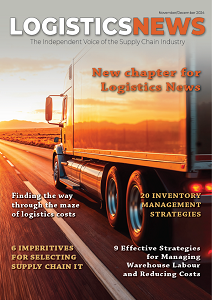Artificial intelligence (AI) and machine learning (ML) are among the hottest topics in supply chain innovation at the moment, but if your company is resistant to using the cloud, you’re going to struggle to take advantage of these new technologies.
When we talk about the benefits of moving to cloud computing, we usually talk about cost savings or flexible on-demand storage and computing, but there are other important benefits to consider, including the enablement of data science, ML and AI.
With the rise of cloud computing over the past decade, we’ve seen an explosion of data science, ML and AI in all industries. The fact is that data scientists are able to do so much more because of the resources they now have available to them through the cloud.
For years, AI has been limited by hardware constraints found in on-premise deployments, making it extremely challenging to adopt ML models in warehouses. Now that supply chain companies are warming up to cloud options, those limiting factors no longer exist. Supercharged by the power of the cloud, distribution managers and industrial engineers can now enhance their ability to:
- Dramatically improve workforce planning and management.
- Proactively re-slot products to improve efficiency.
- Predict and eliminate stockouts and other exceptions.
- Optimise automation/robotics alongside human workers.
- Identify and implement process improvements.
Why is the cloud so important to ML? There are three key reasons why moving to the cloud will enhance your company’s adoption of AI and ML:
- State-of-the-art database technology.
- Centralising your data silos.
- Faster third-party integrations.
Warehousing leaders need to be aware that if they want to embrace data science and AI, they need to take the first step of embracing the cloud for data services.
Database technologies
The top three cloud providers (Azure, AWS and GCP) all specialise in state-of-the-art database technologies that modern ML workflows rely on for fast processing of large amounts of data. Utilising the cloud offers organisations access to this infrastructure and this has democratised, to some degree, the use of AI.
On-premise solutions do exist, but they can be very costly if you don’t have the tech talent to support in-house infrastructure. Talent shortages can add even more risk to an in-house solution in cases when your primary tech lead leaves for a new job and you struggle to replace the talent.
During times of scaling up workflows, the cloud can handle large datasets and you won’t need to purchase additional hardware for maintenance. The buying and managing of equipment are done by the cloud service ongoing hardware maintenance costs.
Centralised data
Data silos are one of the most painful problems to work through as a data scientist and can lead to projects coming in over budget and late. As a data scientist, nothing makes me happier than working with a customer who has taken the time to centralise data infrastructure because I know I’ll be able to get access to required data without issues. When data is siloed throughout an organisation, it can be difficult, if not impossible, to get the data required for a particular project. The cloud offers several solutions to help companies centralise their data and maintain security and permissions.
Engineering setup and integrations make up a large portion of the cost of purchasing vendor AI technology. You will need to provide specific hardware and operating systems and install required software and packages in order to conform to the needs of each vendor. This can cause several headaches and slow down implementations, which will drive up costs.
When both parties are already working in the cloud, there is a clear path to production for those AI services. This is done simply because most of the networking tools needed are made available right in your cloud project. The cloud removes the need for vendors to spend valuable time getting up to speed with on-premise, sometimes in-house built, infrastructure.
Given the hype around cloud technologies, why wouldn’t every supply chain leader push their departments into the cloud? The top concerns we hear from our customers center around data security and preventing unauthorised access to their data. Leaders fear that if they move their data into the cloud, they’re leaving themselves exposed to cyber and ransomware attacks that could cripple their businesses.
The reality is that cloud providers have been providing data services to health care companies and governments with highly sensitive data for years with varying levels of desired security. If you require data security, every cloud provider has the ability to offer the level of security you need, with teams of experts who are fully dedicated to providing cutting-edge security compared to in-house IT teams.
Embracing transformation
In summary, we’ve explored some of the key reasons why the cloud is important to AI and ML adoption and even some of the reasons why people are hesitant to move into the cloud. In short, AI and ML have the potential to transform warehouse operations for very little cost compared to alternatives.
Cloud works on the principle of ‘pay for what you need’. The cloud’s pay-per-use model is good for companies who wish to leverage ML capabilities without much expenditure.
The really exciting thing about the cloud is the way that it allows for collaboration. The more data in the system, the better the intelligence and learnings that can be gleaned from it. Data-rich, real-time, constantly enhanced and optimised. With AI and ML insights powered by the cloud, the enhancements to your core processes and procedures can be transformational. If business leaders are serious about adopting AI within their warehouses, they will need to get serious about cloud adoption too. •

.jpg)


